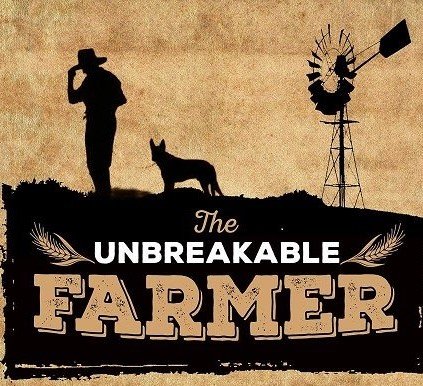JUST A FARMER
There is no such thing as Just A Farmer. They toil everyday to secure our nations food and fibre. They endure many pressures, from weather, to prices, or the ever mounting demand of governance and policy. Every farmer is a jack of all trades. But they are also Husbands, Wifes, Parents, Family members and intrical, driving forces of their rural communities.
I sat alone in a cinema and watched the ‘Just A Framer’ film.
The word overwhelming comes to mind, not just that it resonated with my own story, but it resonated with the stories I hear in every community I have the privilege to work with across Australia.
To Leila McDougall the writer, producer and star of the film, congratulations on depicting what is an all-too-common storyline in rural, regional, and remote communities across Australia.
In fact, it happens every 10 days, where a farmer takes their own life.
According to the National Farmer Wellbeing Report, not only do we lose a farmer every 10 days, 45% of those surveyed have thoughts of self-harm, with 30% attempting self-harm and 27% have feelings of loneliness or isolation (and that is not just geographical), combined with limited access to mental health services.
The mission of the movie was to use the power of storytelling to illuminate the silent struggles within Australian farming communities raising awareness of mental health issues and the lack of comprehensive medical support in rural areas fostering empathy and driving the conversation around mental health.
‘Just a Farmer’ transcends traditional cinema authentically portraying the challenges and triumphs of resilient farmer in rural Australia the cinematic journey amplifies the often overlooked voices of rural communities and sheds light on mental health struggles it's more than a movie it's a dedicated movement creating awareness dismantling stigma zone impacting the well-being of rural Australia just a farmer breaks new ground fostering understanding assuring individuals they don't face their darkness alone.
Personally, I found the film was very confronting.
So many parts and themes of the film resonated with my own story as a farmer and the struggles with my own mental health. The feeling of complete despair, of failure not only to my family, but to my animals and farm, which as a farmer was my core roll, a steward to my land and animals. The guilt and shame I felt through my darkest times was palpable as I sat there and watched. Something else that really resonated with me was the feeling financial, physical and emotional exhaustion that I also experience as we entered the third and then fourth year of the millennial drought. With that exhaustion came a sense of numbness, where I operated on auto pilot for an extended period.
One of the other themes that resonated with my journey was gossip. Small rural communities can be the best places to live, on one hand they are filled with support, love, and connection, but they can also be the most debilitating environments to live in when things are going south. The post box gossip, the lack of empathy to someone’s situation, how words can exacerbate an already demoralising situation.
I think generally the feeling of complete helplessness is the thing that really sat with me.
Many of the general mental health themes in the movie were not recognising the signs, seeking help, isolation, discussing how you are feeling, reaching out to your support network and support services, the concept of generational mental health challenges, which I strongly believe is a quantifiable phenomenon.
The most impactful issue that the movie dealt with was that of living with the death of a loved one to suicide, for the family and for the community as a whole. This is not something that is dealt with by statistics, it is a process of numbness, sadness, anger, reflection, blame, a complex range of emotions that there is no answer for. This was brave to tackle this in the movie, because for most parts, this is a taboo subject that needs more understanding and conversation.
And lastly the movie demonstrated the resilience, fierce determination and sacrifice that every farmer displays to provide our country with food and fibre, at times it comes at unsurmountable cost and if you don’t take anything else away from this movie than to have a greater understand that food and fibre don’t just arrive in the shops and to thank and support our farmers, then it was a worthwhile project.
Since watching Just A Farmer I have had the privilege to have a chat with Leila McDougall on my Podcast Beyond The Back Paddock, where we discuss the motivation behind the movie and what she hope are the messages that people take away from it.
Please if you get the chance get along and see the movie in your local cinema or there are plans to make it available through streaming platforms.
If you have seen the movie and have been struggle with the content or you feel you need to talk to someone about your own struggles please reach out to your family, friends or support network or contact a support service like Lifeline on 131114 or TIACS on 0488 846 988 Mon to Fri 8am to 10pm or reach out to your local Rural Financial Counselling Service.

